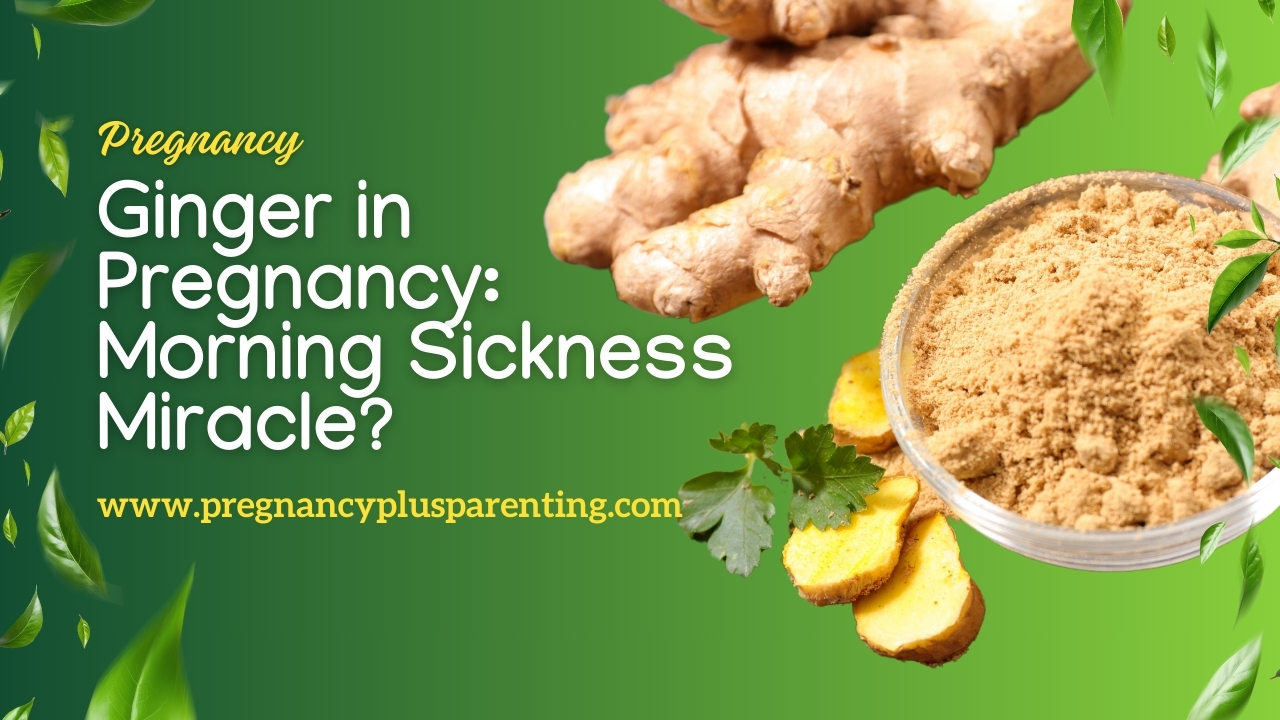Ginger in Pregnancy: Morning Sickness Miracle?
With so many “forbidden” foods and drinks during pregnancy, you may be wondering what the situation is with ginger during pregnancy.
We now want to find out whether the tuber is permitted.
Pregnancy is a magical time: a new life is forming in your body.
As you probably already know, you have to pay attention to what you eat or drink during pregnancy , and it’s not much different with remedies and various herbs.
Caution should also be taken when taking ginger, although it is an excellent remedy for nausea.
Your body is supporting another body inside you and everything must have one goal: to protect the new life.
What you eat or put into your body also affects the fetus.
Food, medications, herbs, supplements, and other home remedies that you normally consume could now be dangerous for you and your unborn child during pregnancy.
It is very important that you always know exactly which substances you can and cannot take
Ginger, for example, is an excellent remedy for morning sickness : But is it okay to eat ginger during pregnancy or is ginger a spice that you should avoid during pregnancy and later while breastfeeding?
When it comes to ginger during pregnancy, opinions differ.
Many women claim that a cup of ginger tea or a ginger shot works wonders for nausea during pregnancy.
But is it safe to eat ginger or can you take it and if so, in what quantities?
Given its growing popularity, many pregnant women are now wondering how to take it and, above all, what contraindications and risks are associated with ginger during pregnancy.
In this article, I would like to explain what you should keep in mind when enjoying ginger as a pregnant woman.
But in this article, we’re going to focus on ginger and see if ginger ale can help you say goodbye to morning sickness.
What is ginger?
Ginger is a plant that is widely used as a spice and in beverages.
The tuber is the part of the plant that is eaten or ingested. Ginger is also used as an herbal remedy. Ginger is used to treat a variety of conditions.
This plant is of oriental origin but is now consumed all over the world.
The potato-like tuber that can be bought in the supermarket or greengrocer’s and eaten grated or cut into very thin slices.
Ginger has a very special taste with a slightly spicy aftertaste and can be combined with all dishes, both sweet and salty.
The most common use is in the preparation of herbal teas, infusion of thin slices cut from the tuber or even as ginger water, which together with a little lemon juice makes a refreshingly delicious drink.
But among the many uses of ginger, it can also be used as a spice to season meat and it also gives smoothies an extra kick.
In short, it is a food that goes with everything and is also very healthy.
Ginger contains essential oils, resins, and gingerol (which gives ginger its well-known spicy flavor). The ginger root also contains a lot of calcium, iron, sodium, phosphorus, and vitamin C.
Ginger is often used to relieve morning sickness, motion sickness, upset stomach, or vomiting.
As an herbal supplement, ginger is available in pills, capsules, and syrups and can be found in lozenges and other foods.
The antibacterial tuber is an excellent natural remedy that is also very inexpensive, and you don’t have to be an expert to prepare something with ginger.
Is ginger allowed during pregnancy?
It is important to know that ginger is by no means forbidden during pregnancy.
But you also have to keep in mind that there is no one-size-fits-all answer to whether ginger is harmful or healthy during pregnancy.
In addition, it also plays a role which week of pregnancy (SSW) you are in and how much ginger you consume.
If you have already enjoyed ginger while pregnant, you don’t have to worry; the occasional cup of ginger tea will not have any negative effects at any stage of your pregnancy.
Ginger in small amounts is also perfectly fine if you are having a “normal” pregnancy.
However, if you are at risk for a pregnancy or have a clotting disorder, you should avoid ginger because ginger can inhibit blood clotting in large quantities, which could be dangerous for you and your baby during pregnancy.
The Institute of Clinical Pharmacology and Toxicology “Embryotox” confirms that ginger can be taken in normal doses throughout pregnancy, although one should be aware of the occurrence of common side effects.
Which means that ginger could never be harmful in small amounts. And now I’ll explain to you how ginger works in each trimester.
Ginger in the 1st trimester
In early pregnancy, there is no risk of miscarriage when taking ginger; on the contrary, ginger helps with colds, morning sickness and relieves heartburn, which many women suffer from in the first trimester.
Ginger in the 2nd trimester
As an expectant mother, you don’t have to worry about taking ginger during the second trimester, either. Ginger root is considered safe during this phase of pregnancy.
Ginger in the 3rd trimester
Even during this trimester, this medicinal plant cannot cause any harm, provided you enjoy and use it in small quantities.
And although there are no studies that prove that ginger poses any risks towards the end of pregnancy, your midwife and gynaecologist will advise you against it for various reasons.
During pregnancy, regardless of which trimester you are in, please consult your gynecologist before taking ginger, whether in capsule form, ginger powder, ginger drops or simply drinking ginger tea.
Larger amounts of ginger are said to have a labor-inducing effect, which means that the substances contained in ginger stimulate the muscles of the uterus, which in turn could lead to premature labor.
Ginger should be consumed in moderation during early pregnancy to prevent premature birth or, in the worst case, miscarriage.
The pungent substances contained in ginger not only affect your intestines, but also stimulate labor.
If you have already passed your due date, you can ask the midwife whether you can stimulate your uterus with a cup of ginger tea so that you can finally meet your long-awaited baby.
How much ginger is safe during pregnancy?
When it comes to consuming ginger during pregnancy, the amount matters. It’s safe to consume one to two grams of ginger per day, divided into two to four doses.
Although ginger is best consumed raw, you can also take it in the form of ginger drops to relieve nausea.
Ginger tea can also help with morning sickness, but you shouldn’t overdo it.
How to take ginger during pregnancy?
Ginger is available commercially not only as fresh root, but also in the form of powder, extract, herbal tea, tablets, lozenges, etc., as well as spices and even ice creams.
However, the most suitable form of ginger remains the one specifically designed for pregnancy: lozenges, tablets and chewing gum, available in pharmacies.
With ginger lozenges for pregnancy, you can be sure that they are quality products that are actually effective.
Even with ginger products from the pharmacy, please handle them carefully and never exceed the prescribed dose.
Ginger during pregnancy as a remedy for nausea
Ginger is a perennial herbaceous plant with digestive and anti-inflammatory properties that has also been widely used in the past as a remedy for nausea during pregnancy.
Some studies have also proven the effectiveness of ginger and, in particular, it has been found that ginger and vitamin B6 both have a very beneficial effect against morning sickness in pregnant women.
Consuming ginger during pregnancy is nothing new, as in the East this spice has long been given to pregnant women to soothe nausea, abdominal discomfort, heartburn, and inflammation.
Ginger has anti-inflammatory properties and, thanks to its antibacterial properties, is still a good ally against colds and flu.
Adding some ginger to dishes is also useful for combating pain such as sudden stabbing pains in the limbs or abdomen.
Ginger can relieve pain without resorting to medication, which is very beneficial for pregnant women as many medications are prohibited during pregnancy.
A cup of ginger tea in the evening before going to bed can be very helpful if you are suffering from morning sickness.
Ginger during pregnancy: benefits
During pregnancy, many women suffer from nausea and vomiting, which varies from person to person and occurs during the first three months.
Morning sickness usually goes away on its own when the mother reaches the fourth month of pregnancy, although symptoms may persist until the 20th week of pregnancy or even until the end of the pregnancy.
In such cases, ginger can be a useful ally that can be very helpful in mild or moderate forms of nausea and even if the mother suffers from hyperemesis gravidarum, ginger can have beneficial effects.
However, in case of hyperemesis gravidarum, it is always better to contact the doctor to be more certain about what to do.
The benefits of ginger during pregnancy:
• Morning sickness
• Constipation during pregnancy
• Digestive problems
• Flu symptoms such as sore throat , cold and cough .
Ginger during pregnancy: contraindications
As mentioned before, as with everything during pregnancy, the same applies to ginger: “Don’t overdo it.”
While ginger tea is a great ally for non-pregnant women to lose excess weight because of its diuretic properties, pregnant women should avoid consuming ginger in large quantities.
A cup of ginger tea is good now and then, but don’t overdo it, because this spice contains a gingerol molecule, which in large quantities can lead to genetic problems in the fetus.
In general, studies with ginger in pregnancy have shown that there are no specific contraindications to this food and ginger continues to be recommended as a remedy for nausea and vomiting during pregnancy.
In small amounts there is no danger to the health of the expectant mother or the baby.
It is important that you do not take ginger on your own, but discuss with your gynecologist which dosages, administration methods and treatment duration are best for you.
Possible negative effects of ginger during pregnancy:
1. BLOOD CLOTTING
It is known that the ginger root can hinder blood clotting.
2. STOMACH IRRITATION
Although ginger has a positive effect on the digestive tract, large amounts can irritate the stomach lining. In addition to stomach upset, bloating, and diarrhea, ginger can also cause heartburn.
3. IRRITATED MOUTH
The spicy tuber can irritate the mucous membranes in the mouth and cause sweating. These are clear signs that you should avoid ginger.
4. EXCESS BILE
Eating ginger can cause your body to produce more bile, which can cause gallbladder pain, especially if you have gallstones.
Final thoughts
The benefits of consuming ginger are indeed great, but as with all herbs and other medicinal plants, caution should be exercised when using ginger.
Too large amounts can pose risks, and before you overdo it and to be on the safe side, it is best to talk to your gynecologist before consuming.
It all depends on the dosage, and you will be able to find out which one is best for you by
consulting a doctor. You should also discuss all medicinal plants and
Inquire about natural remedies to avoid possible risks.
After all, it’s about your and your baby’s well-being. But no one has anything against a cup of ginger tea.
To get smarter, check out the articles on chamomile and peppermint and how else you can combat nausea during pregnancy.
I wish you a wonderful pregnancy and that you and your baby stay healthy!







